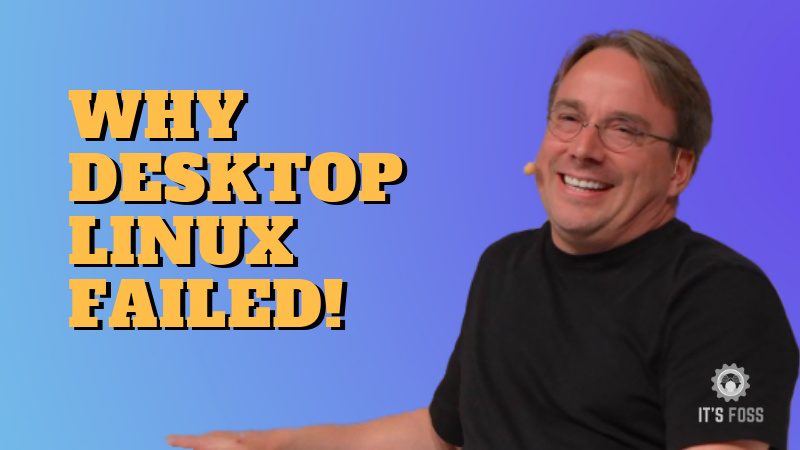Brief: Linus Torvalds has finally spoken his mind over why Linux that rules the servers and the clouds has not succeeded on the desktop front.

Too many cooks spoil the broth.
Too many choices overwhelm the consumer/customer/user.
Too many desktop choices held Linux back from succeeding as a
In an interview with TFiR, Torvalds expressed his views on the ‘failure’ of desktop Linux.
I still wish we were better at having a
standardize desktop that goes across all the distributions… It’s not a kernel issue. It’s more of a personal annoyance how the fragmentation of the different vendors have, I think, held the desktop back a bit.
You can watch the entire interview on TFiR’s YouTube channel. It’s a short video where Torvalds has expressed his views on desktop Linux and Chromebooks.
Chromebooks and Android are the future of desktop Linux!
When I met Jim Zemlin, executive director of the Linux Foundation, at Open Source Summit in 2017, I asked him why Linux Foundation doesn’t work on creating an affordable Linux laptop for masses. Jim answered that Chromebooks are essentially Linux desktop and they are doing exactly that so there is no need
Interestingly, Torvalds also puts his weight behind Chromebooks (and Android).
It seems to be that Chromebooks and Android are the paths towards the desktop.
In case you didn’t know, Chromebooks will soon be able to run native Debian apps. Using Chromebook will give a slightly better ‘Linux feel’. For now, Chromebooks and Chrome OS are nowhere close to the traditional desktop feel despite the fact they run on top of the Linux kernel.
[irp posts=26608]
Torvalds vs GNOME co-founder on What Killed the Linux Desktop
Back in 2012, Miguel de Icaza, the co-founder of Gnome project, wrote an article “What Killed The Linux Desktop” that desktop Linux is almost dead thanks to rapid development and incompatibility across Linux distributions. He said:
This killed the ecosystem for third party developers trying to target Linux on the desktop. You would try once, do your best effort to support the “top” distro or if you were feeling generous “the top three” distros. Only to find out that your software no longer worked six months later.”
Miguel de Icaza, GNOME Project
He also (indirectly) blamed Linus Torvalds:
Linus, despite being a low-level kernel guy, set the tone for our community years ago when he dismissed binary compatibility for device drivers. The kernel people might have some valid reasons for it, and might have forced the industry to play by their rules, but the Desktop people did not have the power that the kernel people did. But we did keep the attitude.
MIGUEL DE ICAZA, GNOME PROJECT
Linus Torvalds today hit back on Miguel’s claims on a Google Plus thread created by Sriram Ramkrishna. Linus said that Miguel’s cliams are laughable:
One of the core kernel rules has always been that we never ever break any external interfaces. That rule has been there since day one, although it’s gotten much more explicit only in the last few years. The fact that we break internal interfaces that are not visible to userland is totally irrelevant, and a total red herring… I wish the gnome people had understood the real rules inside the kernel. Like “you never break external interfaces” – and “we need to do that to improve things” is not an excuse.
Linus Torvalds
What do you think?
I, along with many other Linux users, have felt the same reason behind the not-so-successful state of the desktop Linux. There are too many choices available when it comes to desktop Linux and this is overwhelming to the new users to the extent that they just avoid using it.
Do I feel vindicated that Torvalds thinks the same? Kind of.
What do you think? Do you agree with the opinion that the fragmentation held back desktop Linux? Or do you think that the multitude of choices symbolize the freedom Linux provides to the users? Share your view with us.

